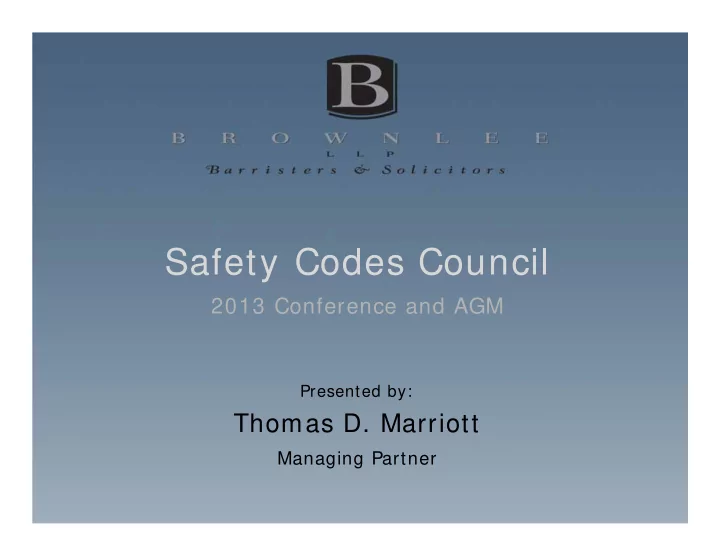

Safety Codes Council 2013 Conference and AGM Presented by: Thomas D. Marriott Managing Partner
Safety Codes and the Law Emerging Trends
Recent Amendments to the Safety Codes Act
Limitation Period •Now, Previously, three six months years
Limitation Period Applies to offences committed on or after December 10, 2012
Rationale • Provides reasonable time: • to identify • Investigate • and prosecute
Offences • Interfering with Administrator or CAO • Make false statement • Contravening Act or Codes • Contravening condition in permit • Contravening Order • Missing time deadline
I ncreased Fines Previously - $15,000 for first offence and $30,000 for subsequent offences. Now - $100,000 for first offence and $500,000 for subsequent offences.
Rationale • Incentive to comply • Deterrent for repeat or continuing offence
Recent Developments in Case Law
Condominium Corporation 012 5331 v. W. De Silva Properties Inc. Any immunity provided is only available where S. 12(1) of SCA that conduct is taken in good faith
Condominium Corporation 012 5331 v. W. De Silva Properties Inc. • R. 129 Application was to dismiss the claim based on the pleadings and the law. • Nothing in claim re bad faith, absence of good faith, or anything other than negligence
Review Statesman • 2010 presentation, 2009 QB case • In non-suit application Court did not dismiss case • In final judgment Court said mere negligence is not bad faith
Condominium Corporation 012 5331 v. W. De Silva Properties Inc. Bad • Negligence can amount to bad faith faith= • required degree of negligence will depend lack of on obligations, statutory and good otherwise faith
Condominium Corporation 012 5331 v. W. De Silva Properties Inc • Based on Court of Appeal decision, • Bad Faith can be: deliberate intent to harm • Very serious carelessness • Most obvious negligence
Condominium Corporation 012 5331 v. W. De Silva Properties Inc. • Court did not rule on novel argument that s. 12 only protects from liability on policy decisions • Practical effects
Wright v. Lyons Plumbing issues led Lyons built home and to discovery of 25 Wright bought home was responsible for deficient items, then from Lyons all permits and code further deficiencies requirements of all kinds
Wright v. Lyons Lyons had no Lyons was aware of experience the Alberta Building performing much of Code work
Wright v. Lyons “The inspectors made sure [the Code was] followed, that’s the way it was”
Wright v. Lyons Former building inspector ‐ “we’re not a babysitting company”
Court Comments on Attitude •Lyon’s attitude toward his Cavalier home building obligations •Confused
Wright v. Lyons
Wright v. Lyons • Builder will be liable if latent defects Latent Defect • Not liable if defects are readily apparent on inspection Negligent • Only actionable if latent defect creates a dangerous situation Construction
Wright v. Lyons Unreasonable to Conclusion = place such reliance Lyons liable upon inspectors
R. v. 555034 Ontario Limited Defendant charged with violating Ontario’s Pled not guilty Fire Protection and Prevention Act
R. v. 555034 Ontario Limited Two Inspectors Many deficiencies attended at the including several Inspector issued building after fire smoke alarms and mailed a Notice on Defendant’s broken or without of Violation rental property batteries
R. v. 555034 Ontario Limited Public welfare offences Strict liability ‐ Prosecution required to prove the actus reus Defendant – avoid liability if exercised due diligence
R. v. 555034 Ontario Limited Evidence of Inspector Due diligence? = actus reus proven
R. v. 555034 Ontario Limited “Reasonable care and due diligence do not mean superhuman efforts” • “The greater the potential for substantial injury, the greater the degree of care required”
R. v. 555034 Ontario Limited Toronto Fire Chief – majority of fatal fires “were the result of no smoke alarms or non ‐ functioning smoke alarms on the premises”
R. v. 555034 Ontario Limited “Loose, disjointed and haphazard plan “Plan was reactive without any as opposed to reasonable form of preventative” co ‐ ordination”
R. v. 555034 Ontario Limited Due diligence = employer communicate adequate instructions to its employees regarding safety precautions
R. v. 555034 Ontario Limited Inconsistencies and contradictions in testimony Defendant did not meet burden of proving due diligence Guilty
QUESTIONS? Thomas D. Marriott 780-497-4868 tmarriott@brownleelaw.com
Recommend
More recommend